Excavation Contractors Leicester
Find top Excavation Contractor in Leicester
Get up to 3 Excavation Services quotes for your project today! Compare profiles, reviews, accreditations, portfolio, etc... and choose the best deal.
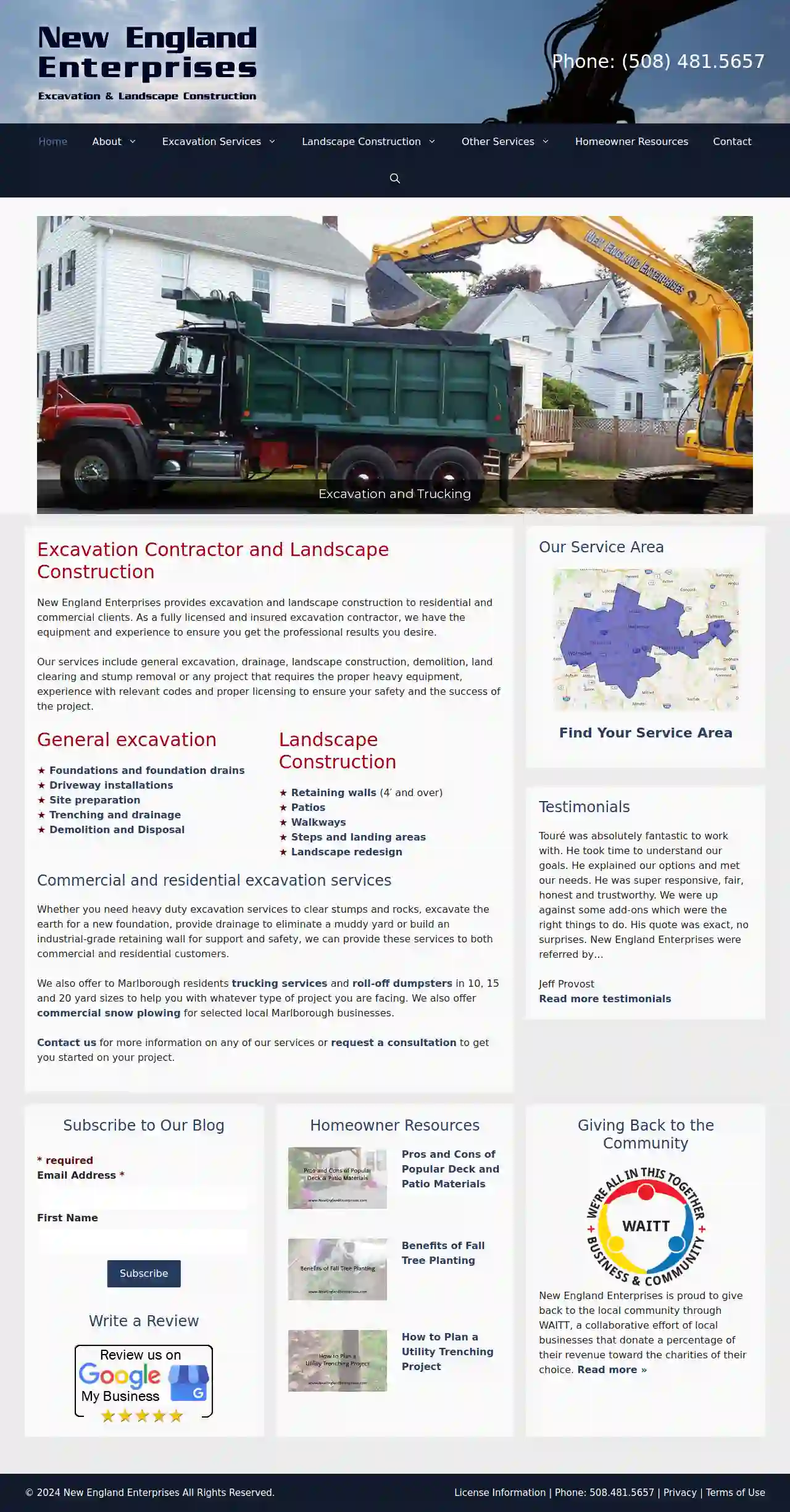
New England Enterprises
510 reviewsPlymouth, USExcavation Contractor and Landscape Construction New England Enterprises provides excavation and landscape construction to residential and commercial clients. As a fully licensed and insured excavation contractor, we have the equipment and experience to ensure you get the professional results you desire. Our services include general excavation, drainage, landscape construction, demolition, land clearing and stump removal or any project that requires the proper heavy equipment, experience with relevant codes and proper licensing to ensure your safety and the success of the project. Whether you need heavy duty excavation services to clear stumps and rocks, excavate the earth for a new foundation, provide drainage to eliminate a muddy yard or build an industrial-grade retaining wall for support and safety, we can provide these services to both commercial and residential customers. We also offer to Marlborough residents trucking services and roll-off dumpsters in 10, 15 and 20 yard sizes to help you with whatever type of project you are facing. We also offer commercial snow plowing for selected local Marlborough businesses. Contact us for more information on any of our services or request a consultation to get you started on your project.
- Services
- Why Us?
- Testimonials
- Gallery
Get Quote
Consigli Construction Co Inc
4.720 reviews100 Cummings Center, Suite 2200, Beverly, USOur Story A history rooted in tradition, a future led with vision. Learn More > Who We Are A fourth generation company founded in 1905, Consigli offers the strength and stability of a large construction manager and the flexibility of a start-up. Our people love what they do and it shows—in their entrepreneurial spirit, in their desire to create environments that strengthen our communities, in the enduring relationships they build and in the pride they take in their craft. A Legacy Built on Accountability Consigli was founded upon the principles of dedication, hard work and commitment to craft. As we evolve, these things will never change. See the Story > Our People, Our Difference We don’t just assign people to projects—we challenge them to learn, lead, teach, problem-solve and rise to every occasion. Meet the People Who Make It Work > Projects That Move Us It’s our purpose to be builders—it’s ingrained in who we are. We create environments and relationships that strengthen our communities and enrich the ways people live, work, learn, heal and play. Let’s Get to Work >
- Services
- Why Us?
- Gallery
Get Quote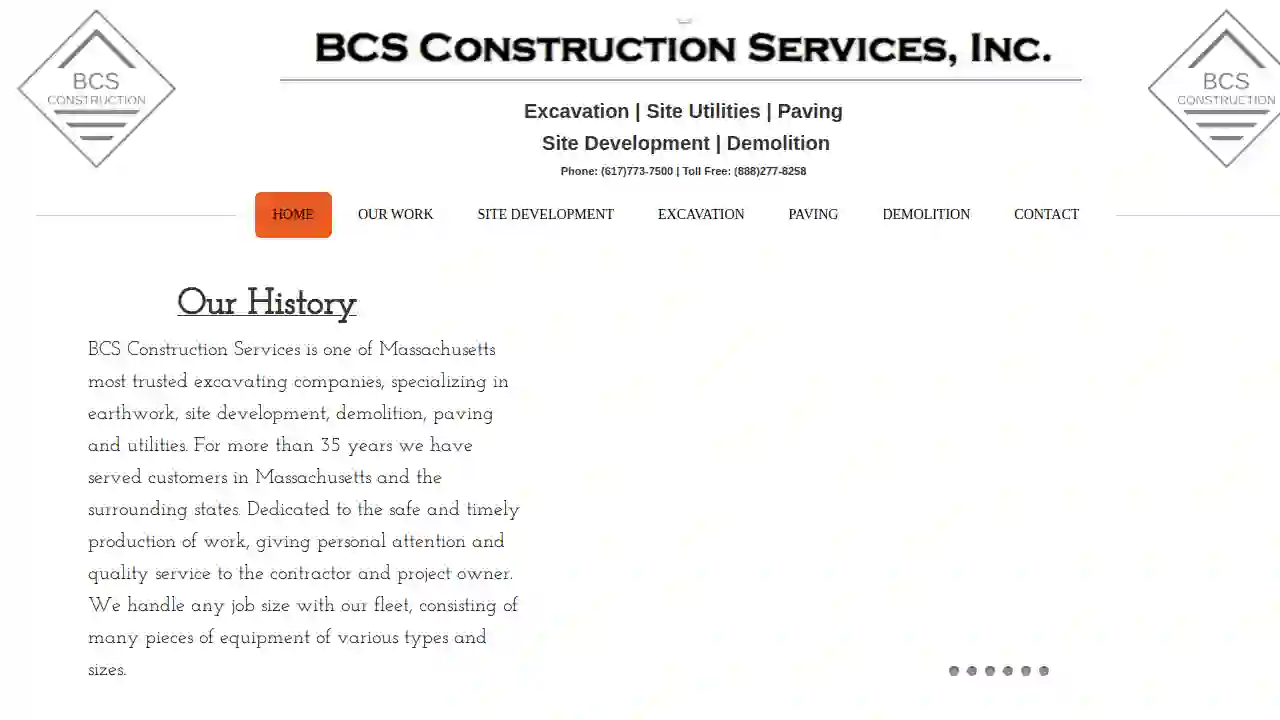
Boston Contracting Services
859 Willard Street, Suite 400, Quincy, 02169, USBCS Construction Services is a trusted excavating company in Massachusetts, specializing in earthwork, site development, demolition, paving, and utilities. For over 35 years, we've served customers in Massachusetts and surrounding states. We're dedicated to safe and timely work, providing personal attention and quality service to contractors and project owners. We handle any job size with our fleet of diverse equipment. Our Core Focus We specialize in a wide range of services, including: Roads Parking Lots Grading and Compacting Industrial Manhole & Catch Basins Municipal Paving Car Dealerships Demolition Our Services We offer a comprehensive range of services, including: Site Development Excavation Paving Demolition Utilities Licenses & Certifications BCS Construction Services holds various construction and engineering licenses in cities and towns throughout Massachusetts. We are licensed to perform all municipal and commercial work, and we hold licenses to operate interstate when necessary. Our team also holds various safety licenses from OSHA. Insurance & Bonding BCS Construction Services is capable of meeting most insurance requirements for mid to large-size commercial jobs. We also hold various bonds with cities and towns throughout Massachusetts. Other Services BCS Construction Services has provided expert witness testimony to assist in various construction and real estate-related activities. Please contact us directly if you are interested in this service.
- Services
- Why Us?
- Gallery
Get Quote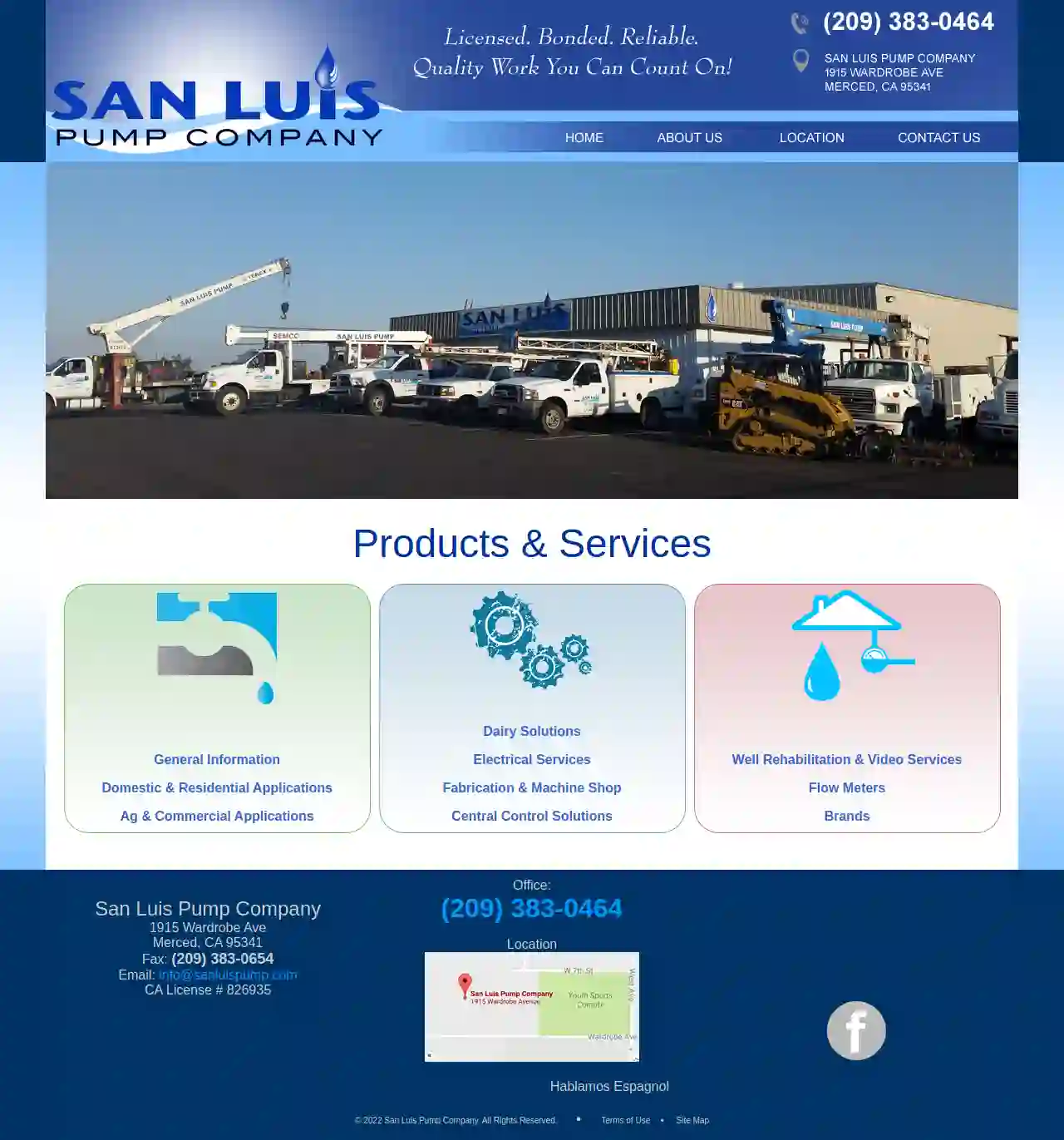
San Luis Pump Company
56 reviews1915 Wardrobe Ave, Merced, 95341, USAbout San Luis Pump Company San Luis Pump Company is a family owned and operated business located in Merced, California. We are proud and committed to servicing customers throughout the Central Valley and beyond. Our experienced team of technicians is dedicated to providing you the best quality service that you can count on every time. We specialize in all aspects of pump and well related service for many different markets: agriculture, dairy, commercial, domestic, industrial and wastewater. We handle everything from your large scale new installations to small domestic repairs and water audits. Many of our team members come from agricultural backgrounds and we know how important water can be to any operation. We understand wells and pumps and the particular problems that can occur and we know that your water needs never stop. That is why we offer dependable and fast 24-hour service.
- Services
- Why Us?
- Accreditations
- Gallery
Get Quote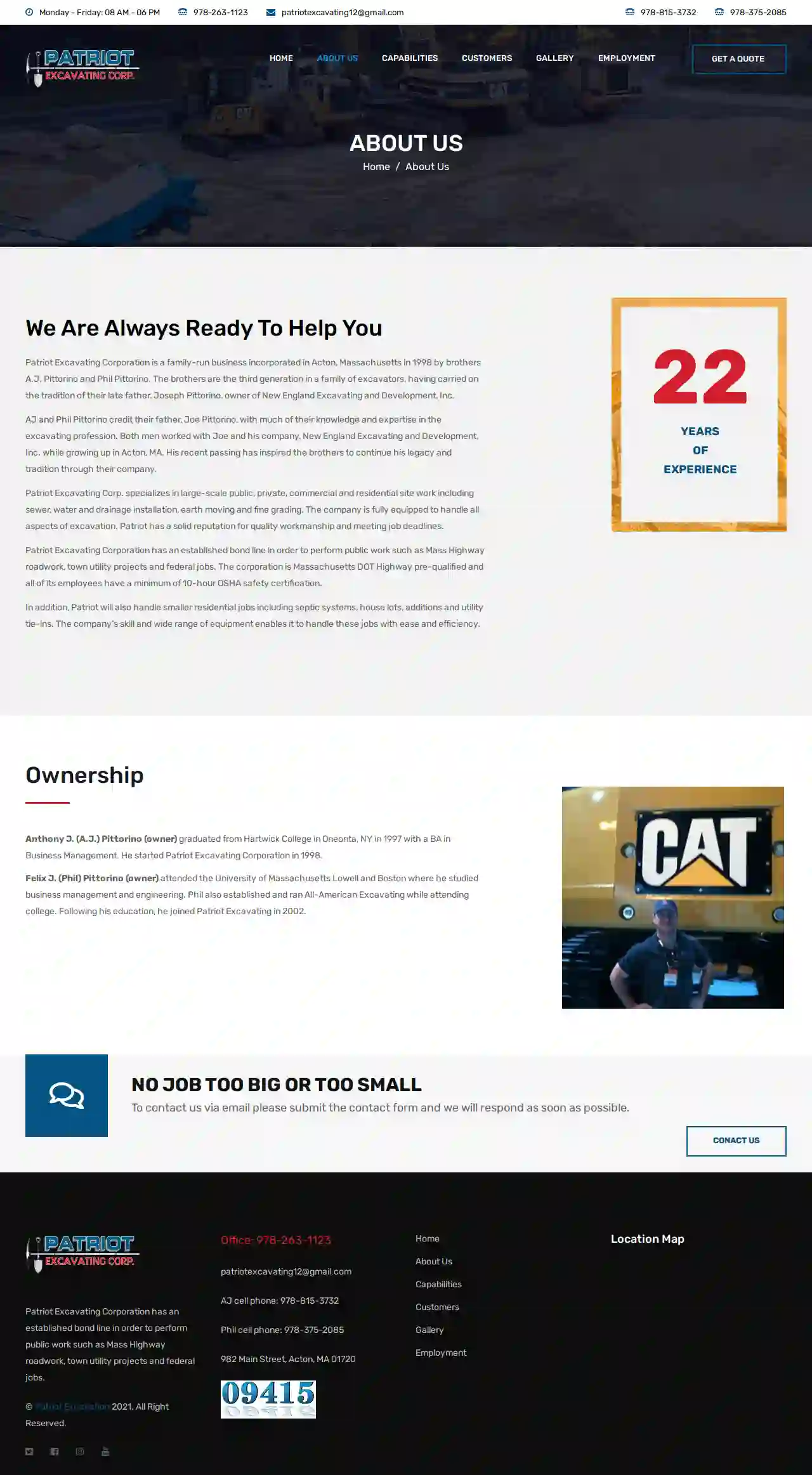
Patriot Excavation
982 Main Street, Acton, 01720, USAbout Us Patriot Excavating Corporation is a family-run business incorporated in Acton, Massachusetts in 1998 by brothers A.J. Pittorino and Phil Pittorino. They are the third generation in a family of excavators, carrying on the tradition of their late father, Joseph Pittorino, owner of New England Excavating and Development, Inc. A.J. and Phil Pittorino credit their father, Joe Pittorino, with much of their knowledge and expertise in the excavating profession. Both men worked with Joe and his company, New England Excavating and Development, Inc. while growing up in Acton, MA. His recent passing has inspired the brothers to continue his legacy and tradition through their company. Our Services Patriot Excavating Corp. specializes in large-scale public, private, commercial and residential site work including sewer, water and drainage installation, earth moving and fine grading. The company is fully equipped to handle all aspects of excavation. Patriot has a solid reputation for quality workmanship and meeting job deadlines. Patriot Excavating Corporation has an established bond line in order to perform public work such as Mass Highway roadwork, town utility projects and federal jobs. The corporation is Massachusetts DOT Highway pre-qualified and all of its employees have a minimum of 10-hour OSHA safety certification. In addition, Patriot will also handle smaller residential jobs including septic systems, house lots, additions and utility tie-ins. The company’s skill and wide range of equipment enables it to handle these jobs with ease and efficiency. Our Team Anthony J. (A.J.) Pittorino (owner) graduated from Hartwick College in Oneonta, NY in 1997 with a BA in Business Management. He started Patriot Excavating Corporation in 1998. Felix J. (Phil) Pittorino (owner) attended the University of Massachusetts Lowell and Boston where he studied business management and engineering. Phil also established and ran All-American Excavating while attending college. Following his education, he joined Patriot Excavating in 2002.
- Services
- Why Us?
- Our Team
- Gallery
Get Quote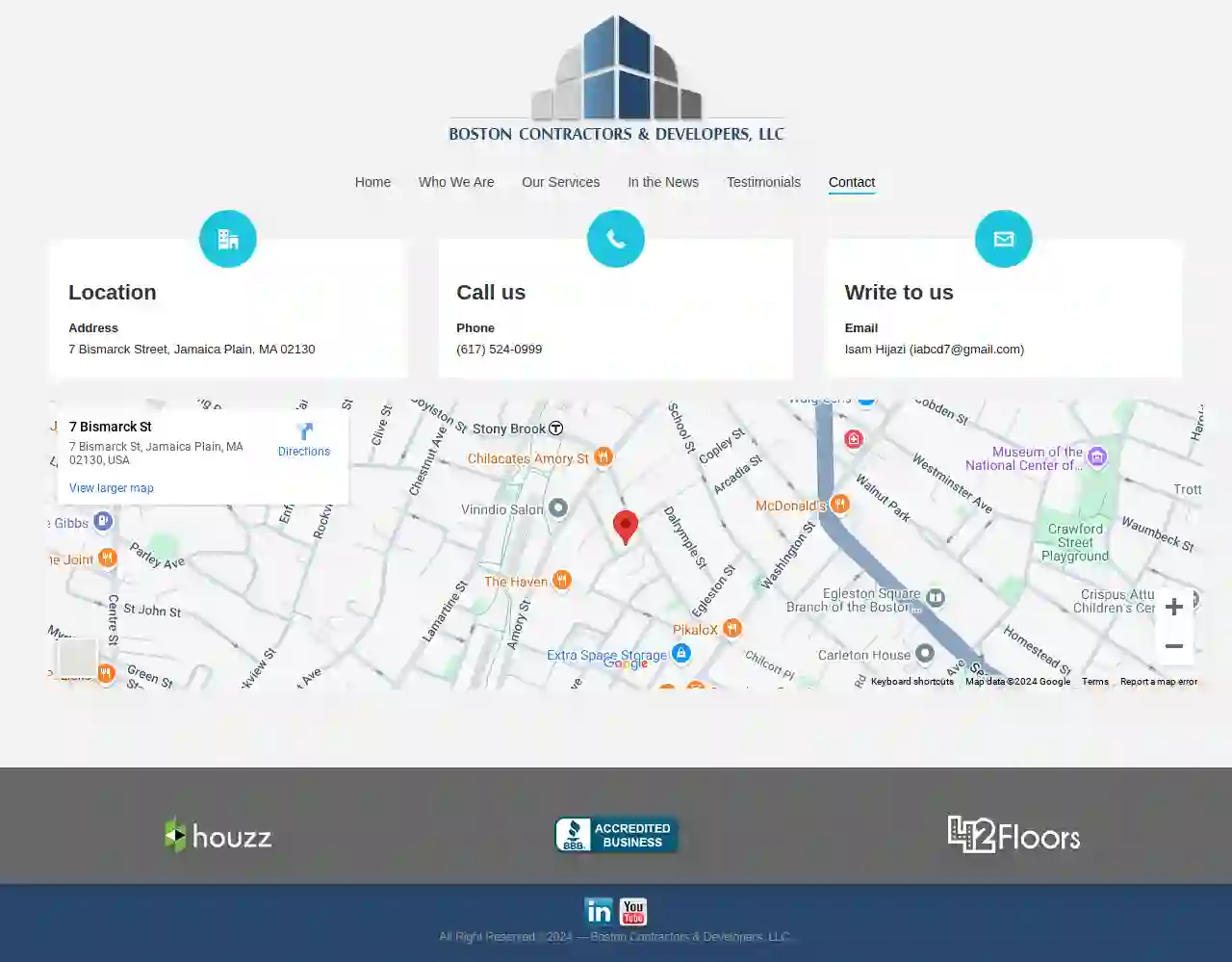
Boston Contractors & Developers, LLC
7 Bismarck Street, Jamaica Plain, 02130, USFrom concept to creation, building your visions, creating reality, engineering your dreams with us. Small enough to listen, big enough to deliver.
- Services
- Why Us?
- Gallery
Get Quote
Luciano's Excavation Inc
56 reviews41 Taunton Green Suite 102, Taunton, 02780, USABOUT US Lucianos Excavation is a family owned and operated business. We provide experience and guidance throughout the construction process. With Cost Effective Solutions, we apply best business practices to complete and meet your needs. Luciano Ribeiro came over to America in 1985, from the Cape Verde islands. After ten years of building boats for Boston Whaler, he decided he needed a new career and turned to construction in 1995. He started from the ground up, as a laborer, doing what ever he could to soak up all the knowledge around him. After a year of hard work and staying late off the clock to learn how to move the equipment, they finally gave him a chance to operate machinery. Starting off in the loader gave him a chance to get the feel for heavy equipment, after 3 years of gaining experience he was finally able to get into the excavator. 25 years later he has now become one of the best excavator operators in New England, and his quality of work never goes unnoticed! From dredging ponds to putting in revetments, there is nothing he is unable to do in an excavator!
- Services
- Why Us?
- Gallery
Get Quote
Structure Tone
52 reviewsStamford, USWho We Are We are a family of companies building amazing spaces across the US, Canada, UK and Ireland. History Founded in 1971, we have grown into an organization made up of over 4,700 employees across 54 offices.
- Services
- Why Us?
- Gallery
Get Quote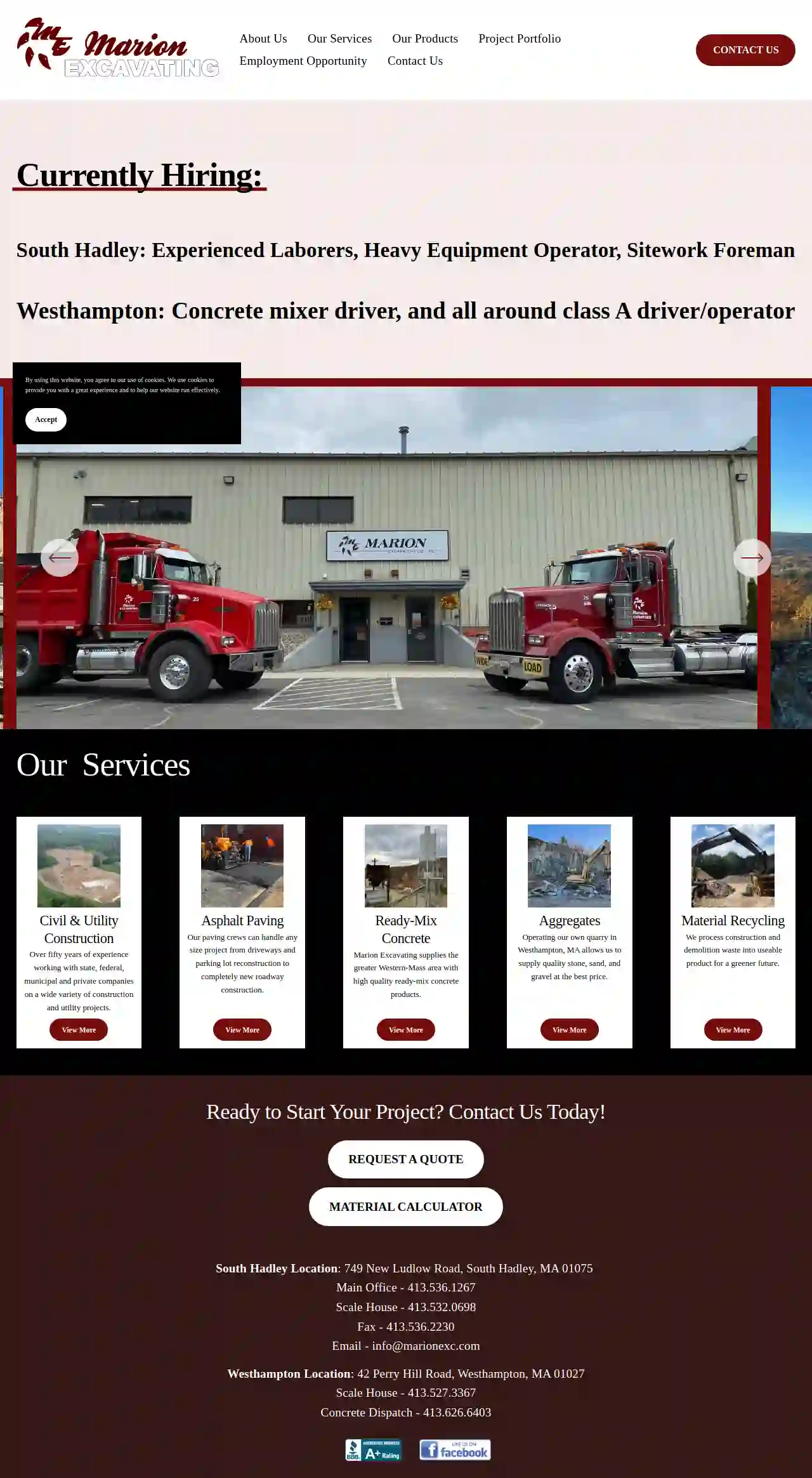
Marion Excavating Co., Inc.
4.413 reviews749 New Ludlow Road, South Hadley, 01075, USA regional leader since 1968 Servicing Massachusetts & Connecticut Operating since 1968 and incorporated in 1972, Marion Excavating has a long history of serving Western Massachusetts and neighboring areas safely, reliably, on schedule and on budget. Founding brothers Rich, Lee, and Russ Marion launched the business with one backhoe and a truck, quickly gaining a reputation for superior workmanship, safe practices and dependability. Over the years and now in its second generation, Marion Excavating has steadily expanded to meet growing customer demand while delivering the same level of high quality work and value. Fully Equipped, Fully Prepared Today, Marion Excavating takes on a comprehensive range of jobs, both large and small, for commercial, municipal, federal and residential customers. We have a professional staff of over 60 experienced operators, truck drivers and laborers; a large fleet of cutting-edge equipment fitted with the latest GPS technology; A construction recycling & materials facility; Quarry with aggregate processing capability; and a ready-mix concrete plant with delivery service. Marion Excavating is committed to delivering excellent results, which includes high-level environmental awareness and meticulous budget tracking. Contractors across the U.S. rely on our local expertise to fully manage environmentally sensitive projects: asphalt removal and replacement, site development, sewer lines, demolition, storm water management, erosion control and other critical jobs in the region. We have also successfully completed a number of wetland replication projects. Marion Excavating has an excellent track record of securing certification credits for LEED® compliant projects and we are MassDOT prequalified for highway construction, drainage, sewer and water projects.
- Services
- Why Us?
- Gallery
Get Quote
Modern Excavation
41 reviews387 Old Columbia Street, Adams, 01220, USModern Excavation, Inc. Modern Excavation, located in the beautiful Berkshires of Western Massachusetts, services residential as well as commercial customers in all areas of New England. At Modern Excavation you will experience professional work at an honest price, plus ...fast ...friendly ...courteous service. In addition to excavation, we offer many related services throughout the Berkshires, including the southern Berkshire areas of Lenox, Lee, Stockbridge, Becket, Otis, Great Barrington, Sheffield and more. Whether you are a year-round resident of the Berkshires, or a second home owner, we are here to assist you at all levels of service, including excavation, sewer and septic, site work, site & land clearing, waterline replacement, swimming pools, drains, trenching, pool removal, driveways, sand, gravel & top soil, concrete removal, septic system installations and Title V inspections. From simple projects to major repairs, you can count on us for ...Fast ...Friendly ...Courteous Service. Modern Excavation provides a wide range of services to both home owner's and contractors in all areas of New England. We offer Free Estimates and for your convenience we accept MasterCard, VISA and American Express.
- Services
- Why Us?
- Gallery
Get Quote
Over 22,076+ Excavation Businesses on our platform
Our excavation pros operate in Leicester & beyond!
ExcavationHQ has curated and vetted Top Excavation Contractors in Leicester. Find the most reliable pro today.
Frequently Asked Questions About Excavation Contractors
- Soil Type and Stability: Stable, cohesive soils allow for deeper excavations than loose or unstable soils.
- Groundwater Level: Excavations below the water table require dewatering techniques to manage water intrusion.
- Equipment and Resources: The size and capabilities of excavation equipment influence the achievable depth.
- Safety Regulations: OSHA and other safety regulations impose limitations on trench depths without proper shoring or sloping.
- Project Requirements: The purpose of the excavation (basement, pool, foundation) determines the necessary depth.
- Hauling to Designated Disposal Sites: Transporting excavated material to approved landfills or recycling centers.
- Recycling or Reuse: If suitable, some excavated soil might be recycled for other projects or reused on-site for landscaping or backfilling.
- Complying with Regulations: Adhering to local and environmental regulations for soil disposal to prevent contamination or illegal dumping.
- Sloped Property: Your property has a significant slope, making it prone to soil erosion or landslides.
- Creating Usable Space: You want to level off a sloped area to create a flat surface for patios, gardens, or other outdoor spaces.
- Preventing Damage: Erosion is threatening existing structures, driveways, or walkways.
- Landscaping Features: You're incorporating tiered gardens, raised beds, or other landscaping elements requiring soil retention.
- New Construction: Laying foundations, basements, or underground utilities for new buildings.
- Home Additions: Creating space for new rooms, basements, or extensions.
- Landscaping: Leveling ground, creating slopes, installing retaining walls, or digging for ponds or pools.
- Drainage Improvement: Installing French drains, drainage ditches, or swales to manage water runoff.
- Utility Installation or Repair: Laying new water, sewer, gas, or electrical lines, or repairing existing ones.
- Demolition: Clearing debris and preparing the site after demolishing a structure.
How deep can you excavate?
How do you handle soil disposal after excavation?
How do I know if I need a retaining wall?
How do I know if I need excavation for my project?
How deep can you excavate?
- Soil Type and Stability: Stable, cohesive soils allow for deeper excavations than loose or unstable soils.
- Groundwater Level: Excavations below the water table require dewatering techniques to manage water intrusion.
- Equipment and Resources: The size and capabilities of excavation equipment influence the achievable depth.
- Safety Regulations: OSHA and other safety regulations impose limitations on trench depths without proper shoring or sloping.
- Project Requirements: The purpose of the excavation (basement, pool, foundation) determines the necessary depth.
How do you handle soil disposal after excavation?
- Hauling to Designated Disposal Sites: Transporting excavated material to approved landfills or recycling centers.
- Recycling or Reuse: If suitable, some excavated soil might be recycled for other projects or reused on-site for landscaping or backfilling.
- Complying with Regulations: Adhering to local and environmental regulations for soil disposal to prevent contamination or illegal dumping.
How do I know if I need a retaining wall?
- Sloped Property: Your property has a significant slope, making it prone to soil erosion or landslides.
- Creating Usable Space: You want to level off a sloped area to create a flat surface for patios, gardens, or other outdoor spaces.
- Preventing Damage: Erosion is threatening existing structures, driveways, or walkways.
- Landscaping Features: You're incorporating tiered gardens, raised beds, or other landscaping elements requiring soil retention.
How do I know if I need excavation for my project?
- New Construction: Laying foundations, basements, or underground utilities for new buildings.
- Home Additions: Creating space for new rooms, basements, or extensions.
- Landscaping: Leveling ground, creating slopes, installing retaining walls, or digging for ponds or pools.
- Drainage Improvement: Installing French drains, drainage ditches, or swales to manage water runoff.
- Utility Installation or Repair: Laying new water, sewer, gas, or electrical lines, or repairing existing ones.
- Demolition: Clearing debris and preparing the site after demolishing a structure.